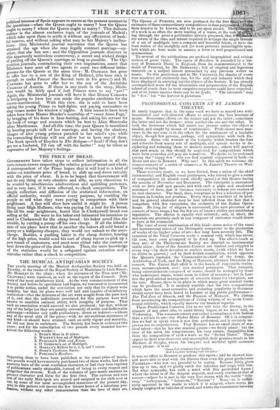THE MUSICAL ANTIQUARIAN SOCIETY.
THE yearly meeting of the Musical Antiquarian Society was held on Tuesday, at the rooms of the Royal Society of Musicians in Lisle Street ; Mr. HORSLEY in the chair ; when the accounts of the Trea-urer (Mr. CHAPPELL) were received, as well as the report of the Council. Both were of the most satisfactory kind. At the very commencement of this Society and before its operations had begun, we ventured to recommend it to public notice, under the conviction not only that its objects were laudable, but that its plans were well laid and capable of satisfactory realization—that the interests of the art were sought from the pure love of it, and that the individuals associated for this purpose were well known to combine eminent ability with integrity of purpose. That such an association would succeed we also predicted : but that, without any of the helps (as they are usually esteemed) of noble and fashionable patronage—without any puffs preliminary, direct or indirect—without any of the usual aids of the press—with no adventitious assistance of any kind—it should have attained such an early vigour and maturity, we did not dare to anticipate. The Society has been in existence two years; and for his subscription of two pounds every member has re- ceived the following works- 1. BYRD'S Mass in D minor.
2. WILBIE'S first set of Madrigals.
3. PURCELL'S Dido and "Enos.
4. 0 GIBBONS'S set of Madrigals. 5. MoaLxy's Ballets for 4, 5, 6, and 7 voices.
6. Byao's Cantionee Saone.
7. PURCELL'S Bonduca.
Supposing them to have been published at the usual price of music, two pounds would have scarcely purchased two of these works, had their contents been of the most worthless character, or had they been reprints of publications easily attainable, instead of being in every respect and altogether the reverse. Bich of the volumes of part-music assumes its present character and form for the first time. The curious and rare sets of the early Madrigals are scored and assigned to the clefs now in use, by some of the most accomplished musicians of the present day, who to this patient toil devote the few leisure hours of a laborious pro- fession, without any other remuneration than the love of their art
The Operas of PURCELL are now produced for the first time, and the existence of these extraordinary compositions is thus perpetuated. These facts deserve to be known, and to be put upon record. The editorship of a work is so often the mere lending of a name, or the task a - ing through the press a publication already prepared, that fe
are aware of the time and labour required to arrange the single threads of a set of madrigals into a compact and beautiful fabric, or have the least notion of the unsightly and (to most persons) unintelligible sym- bols which are here made to assume a form so well proportioned and symmetrical.
To several of the publications are prefixed biographical and critical notices of great value. The opera of Boaduca is preceded by a his- tory of Dramatic Music in England, from its commencement to the death of PURCELL, by Mr. RIMBAULT ; full of original and inenious research on a subject almost untouched by any previous writer on music. To this gentleman and to Mr. CHAPPELL the thanks of every true musician are eminently due, for the zeal and industry which they have displayed in carrying out the objects of the Society. It has already accomplished more for the illustration and perpetuation of the English school of music than its most sanguine supporters could have expected ; and of its future success there can be no doubt. " The labourers" may be "few," but "the harvest is plenteous."


























 Previous page
Previous page